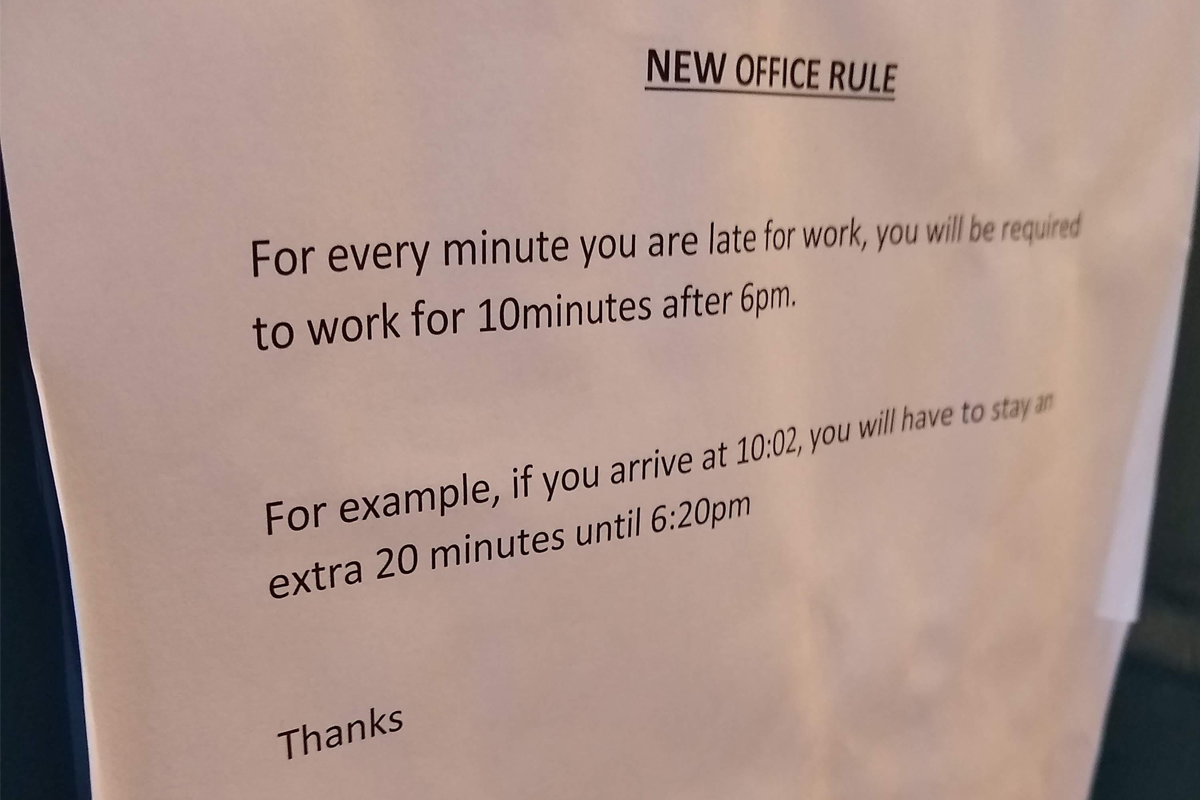A company is stirring outrage after implementing a strict new rule requiring employees to work an extra ten minutes every minute they’re late. That means being two minutes late will cost them an additional twenty minutes at the end of their shift.
While most workplaces offer a grace period for unexpected delays like traffic or alarm mishaps, this harsh policy has employees and outsiders alike questioning whether it’s fair or overly punitive – especially as many companies allow employees to be up to 10 minutes late without facing penalties. This helps to acknowledge the human factor and accommodate unexpected circumstances.
The ‘Stay Late’ Penalty: A Controversial New Policy
However, this isn’t always the case. A content creator named Callie recently shared a sign that went viral on Reddit. The sign from an unidentified workplace revealed an extremely strict rule: no grace period for late arrivals.
The company posted a sign informing employees that they would be required to work an additional 10 minutes for every minute they were late. “For every minute that you are late to work, you’ll be required to work for 10 minutes after 6 p.m.,” the sign read.
“For example, if you arrive at 10:02, you will have to stay an extra 20 minutes until 6:20 p.m.,” it said. “First off, how do you equate a minute to 10 minutes?” Callie questioned. She noted that it would be unreasonable even if the policy were one minute of overtime for every minute late.
Callie pointed out that the company’s requirement to work ten extra minutes each minute you are late is completely insane. The office rule quickly sparked outrage online, with many questioning whether the “extra work” would be compensated.
Outrage And Backlash: Employees React To The Policy
Many commenters pointed out that if this time were unpaid, it would directly violate labour laws. Callie had the same concern. “Is this company completely comfortable with paying all of this sudden overtime because they’re forcing employees to stay 20, 30, 40 minutes over because they were four minutes late for work?” she asked.
These employers are not only taking away the flexibility you’d expect from a company but also trying to control their employees’ evenings and personal time. How can you justify equating two to twenty minutes if you genuinely care about your employees’ well-being?
Commenters suggested that this employer’s strict policy would likely lead to employee dissatisfaction, increased overtime costs, potential acts of “malicious compliance,” and even the risk of wage theft.
“Do you want to lose employees? Because that’s how you lose employees,” one Reddit user wrote. For example, a recent TikTok video by Chris Donnelly highlights the story of a manager who abruptly revoked an employee’s approved birthday leave, insisting they work instead. Infuriated by this unprofessional behaviour, the employee resigned to protest, disregarding their boundaries.
“I guarantee that no member of management is ever going to be in accordance with this rule,” Callie insisted. “If my shift is 10 to 6 and I show up at 10:02, I’m still leaving at 6. Maybe, the absolute latest I’d leave would be 6:02.”
However, many commenters suggested that they would not only comply with the extra work requirement but also intentionally exploit it, deliberately wasting their bosses’ time and money through “malicious compliance.”
“I’d be 5 minutes late every day and rake in all the overtime pay. See how quickly they’d change that policy then,” one viewer suggested. “Let’s not forget, though, this is a JOB, not high school.” This sentiment permeates the entire discussion. More employees than ever are being treated like children, micromanaged, underpaid, and dehumanised.
Forcing employees to work extra without compensation is a recipe for disaster, leading them to quit, as evidenced by the case of an employee named Daisy. She was consistently required to work late nights and weekends.
Despite her repeated late nights and weekends without additional pay, her boss dismissed her concerns, demanding more “flexibility.” Feeling unheard and exhausted, Daisy made the difficult decision to quit.







